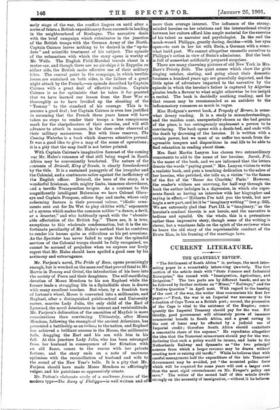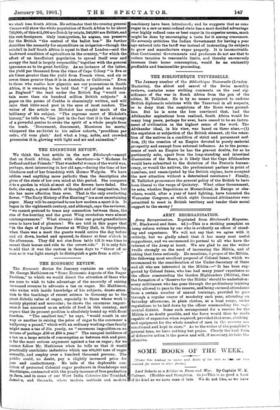C (IRRENT LITERATURE.
THE QUARTERLY REVIEW.
"The Settlement of South Africa" is, perhaps, the most inter- esting paper in a remarkably interesting Qasrterly. The first section of the article deals with "State Finance and Industrial Enterprise," the second with "immigration, Agriculture, and Irrigation." The two parts are by different hands, and are to be followed by further sections on "Mines," "Railways," and the "Native Question" in April next. With regard to the bearing of the cost of the war, the writer thus summarises his first few pages :—" First, the war is an Imperial war necessary to the retention of Cape Town as a British port ; second, the possession of the Cape is vital to the existence of the Empire ; conse- quently the Imperial Treasury should pay for the war. But thirdly, good government will ultimately prove of immense commercial benefit to South Africa, and a great saving in the cost of loans may be effected by a judicial use of Imperial credit ; therefore South Africa should contribute a reasonable share of the expense." He repudiates altogether the idea that the Transvaal mineowners should pay for the war, declaring that such a policy would be insane, and looks to the Netherlands Railway and dynamite as "the two principal sources from which a larger revenue may be drawn without creating new or raising old tariffs." While he believes that with careful management half the expenditure of the late Transvaal Government may be avoided, yet "the mounted police force which will be required for some years will cost a larger sum than the most rigid retrenchment on Mr. Kruger's policy can save." The writer of the second half of this article dwells strongly on the necessity of immigration,—without it he believes we shall lose South Africa. He estimates that the coming general Census will show the white population of South Africa to be about mow; of this 415,000 are Dutch by origin, 340,000 are British, and the rest foreigners. Only immigration, he argues, can preserve for the British "the control of the ballot box." He farther describes the necessity for expenditure on irrigation—though the rainfall in half South Africa is equal to that of London—and the backward condition of agriculture in the country, "for which the effort of an insufficient population to spread itself over and occupy the land is largely responsible," together with the general ignorance as to its great fertility. As an instance of the latter, the yield per thousand from the vines of Cape Colony "is five or six times greater than the yield from French vines, and six or seven times greater than it is in Australia or California." Even to those who realise how gigantic are our possessions in South Africa, it is amazing to be told that "if peopled as densely as England" the land under the British flag "would con- tain more than six hundred million British subjects." A paper on the poems of Crabbe is charmingly written, and will raise that little-read poet in the eyes of most readers. The writer of the article on Micbelet has caught much of the brilliancy of his subject. "The supreme merit of Iclichelet's history," he tells us, "lies just in the fact that it is the attempt of a powerful genius to evoke the spirit of a whole people from
the tomb. Doucement, doucement, Messieurs lea morts,' whispered the archivist to his sallow cohorts, procedons par ordre, vous plait.' And what a long, noble, and crowded procession it is, glowing with light and air and animation."



















































 Previous page
Previous page